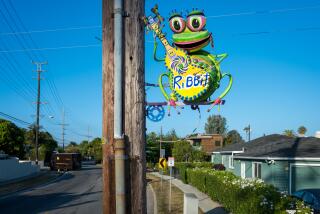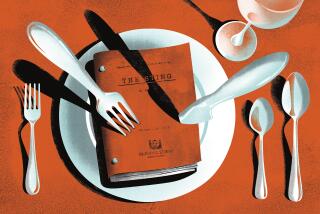MADD Leader Pays High Price for the Heady Life of a Celebrity
- Share via
WASHINGTON — These are heady days for businesswoman Norma Phillips--on stage with President Reagan, singing with Stevie Wonder, dining at fancy French restaurants. The price of admission was her son’s death at the hands of a drunk driver.
She vented her anger by forming the San Diego chapter of Mothers Against Drunk Driving (MADD) in 1982; today, she is MADD’s national president and by her estimate spends 80% of her time away from her luxurious home in Escondido, relentlessly campaigning from pizza parlors in Toledo to the Rayburn House Office Building in the nation’s capital that drinking and driving is unacceptable.
It has become her passion, totally consuming a woman who does not want for diversion: a family garage filled with two Mercedes-Benzes, a Jaguar, a stretch limousine and a Rolls Royce; a ski boat docked at Lake Havasu; jewelry, and a poodle with its own bedroom in her elegant, 5,200-square-foot custom-designed home.
She has been spoiled rotten her entire life, Norma Phillips acknowledges, first by her parents and now by her husband of 20 years, Harold Phillips. And by her reasoning, the best way to respond to her son’s death was to throw not money--what’s money?--but to put virtually her every waking hour into MADD.
During a 3 1/2-day visit here recently, she attended three receptions, handed out public service awards, lobbied congressmen, shared a press conference with a senator, testified at a congressional hearing, participated in an all-day drunk driving workshop and met with local MADD chapter members.
Everywhere she goes, Phillips, 49, projects MADD as the nation’s most successful organization in readjusting society’s attitude toward drinking and driving. It arguably is. But, reflecting its current leadership, MADD cuts a different image today than the one that fired up a nation to rebel against drinking drivers in the early 1980s.
It was MADD’s frenzied founder, Candy Lightner, who became a folk heroine of sorts in pricking the public conscience after her daughter was killed by a drunk driver in 1980.
No Mystery to Magic
There was no mystery to MADD’s magic in the media: here were mothers willing to go public with their grief over the loss of their children to drunk drivers in a society where the marriage of booze and cars was punishable by a slap on the wrist.
MADD grabbed the nation by its shoulders and shook. Legislators passed new laws, judges meted out tougher sentences, prosecutors were less willing to plea bargain, police departments got more money for drunk driving enforcement, teen-agers were spoon-fed anti-drunk driving messages and the victims of drunk drivers received counseling and support.
Then, MADD’s board of directors and Lightner split in October, 1985. Lightner said she and MADD had together reached their peak and it was her time to bow out while on top; MADD’s directors said Lightner’s brand of zealous--and sometimes ungraceful--leadership had worn thin and that the organization’s staff, finances and programs were beyond Lightner’s management expertise.
Lightner left the organization with a two-year contract to serve as a $7,000-a-month consultant--with a stipulation that she would not criticize the organization she founded.
Concern in the Ranks
With Lightner’s departure came concern in the ranks that the movement was destined to become institutionalized and ineffective. The novelty had worn off and now the zealous leader was gone.
The challenge to Phillips--who at five feet once had to stand atop a senator’s briefcase to reach the television microphones at a press conference--is to keep the message fresh and stimulating, with equal doses of genuine passion and some tried-and-true cliches: “We won’t be out of business until the day when no one dies from an alcohol-related crash.”
So Phillips comes to Washington and beats her drum--not as noisily as Lightner but, some say, with a bit more rhythm and finesse.
For Norma Phillips’ family, the curse of drunk driving hit on Nov. 29, 1981, when Dean, 24, her only son by a previous marriage, and his girlfriend, Laticia Crosthwaite, 20, left the Phillips home in Escondido after a Thanksgiving dinner to meet Laticia’s family in the Anza Borrego State Desert for a weekend of off-road vehicle fun.
The couple joined three other cars for the caravan to the desert. Near Warner Springs in northern San Diego County, a man driving a Rolls Royce crossed the center line of the highway and crashed head-on into Dean Phillips’ pickup truck, compacting the cab to 12 inches in height.
Norma and Harold Phillips handled their anger differently; Harold Phillips to this day has difficulty discussing Dean’s death, and was willing to simply donate money to MADD in his son’s memory. Norma, on the other hand, said she needed a way to vent her anger “and I said, let’s give me, not money.’ ”
So with the family’s blessing, Norma Phillips activated the San Diego chapter of MADD in an office in Escondido where her husband runs his companies--one, a firm that manufactures precision measuring devices for high-tech industry; the other, a swimming pool service company. Harold Phillips coached his wife by video taping and then critiquing her practice speeches, and analyzing her media appearances for content and form.
Rose Rapidly
She won immediate acceptance in the San Diego area, and quickly began making appearances throughout California. Lightner elevated her to MADD’s California representative for legislative affairs, then to the national board of directors, where she chaired an executive committee overseeing national issues.
So when Lightner and MADD had their falling out, all eyes fell on Norma Phillips.
But she did not act without first ducking out to a pay phone and calling her husband at home for his advice. He told her to accept the job.
She took to it immediately, fellow MADD board members said. Unlike her predecessor, who had rankled some MADD members and politicians alike with her assertiveness and brusqueness, Phillips is smoother, more gracious and, according to those who work with her, presents a more sophisticated image.
“By all rights, MADD’s life expectancy should have been four years. We should be dead by now, because these organizations come and go,” said Steve Lawrence, the executive director of MADD, who heads a national staff of 33 people and a budget of $9.5 million.
His assessment is shared by others.
Jim Burnett, chairman of the National Transportation Safety Board, watched from a distance as Norma Phillips mingled in the crowd at a reception of the National Assn. of Governors’ Highway Safety Representatives, in the Rayburn House Office Building.
“What surprises me and a lot of the rest of us is that we thought we would have to move in a hurry (to take advantage of MADD’s initial publicity). The window of opportunity would go away after a few years,” Burnett said.
‘Increasingly Effective’
“Well, it hasn’t and now I don’t think it will. But the activists are different now. They’ve matured in their approach. Early on, it was ‘reaction, punishment and revenge.’ They weren’t all that sophisticated. They’ve become increasingly effective, without losing their energy.”
Lightner disagrees. While cautious about criticizing MADD specifically, she said “the anti-drunk driving movement in general” is dying and may not sustain itself for that long haul.
“There is no leadership in the overall movement, no activism. There’s no one yelling at governors and talking about the issue. They’ve all lost the passion, the motivation, the dedication,” Lightner said. “It has become a bureaucracy; we’ve become complacent. MADD has peaked. We had accomplished one of the major issues we set out for (a national drinking age of 21; those states that refuse forfeit a portion of their federal highway funding). So now you don’t have anyone up there screaming and yelling anymore.”
Said Lightner of Phillips: “She’s a sweet person.”
Sees Better Methods
Phillips is, by her own account, neither a screamer nor a yeller. There are better methods to accomplish MADD’s agenda, she said.
Phillips’ more understated presence may be paying off, said Assemblyman Larry Stirling (R-San Diego), chairman of the Assembly’s Public Safety Committee and someone who has dealt with both Phillips and Lightner.
“Norma (Phillips) is poised, dignified, credible and intelligent, which is distinguished from the chanting, hysterics and histrionics which characterizes so much of the testimony we get up here,” Stirling said.
“Candy was the rugged individualist willing to break some eggs if necessary. She was the point man. Now it’s time for the sustainers to come along, and that’s a different type of person.”
MADD activities vary from chapter to chapter and state to state, and may focus on court monitoring, public service announcements, classroom education, bartender intervention training and grass-roots lobbying.
Mass of Press Clippings
One of her roles, Phillips said, is to lend her national name to the local chapters at press conferences (there are nearly 400 local chapters); she estimated that since taking over the national presidency of MADD, she has been heard on 1,000 radio interviews and 500 television interviews. Her collection of press clippings, she said, is thicker than the one generated by Lightner.
For its part, the liquor industry today offers less than unconditional support of MADD’s efforts, contending that MADD harps too much on retribution against drunk drivers.
“A more balanced approach would be more effective in the long term--one that involves not just enforcement and prosecution, but treatment, rehabilitation and education,” said Lynne Strang, spokeswoman for the Distilled Spirits Council of the United States.
Strang noted that the consumption of hard liquor in the United States has dropped 12.1% from 1980 to 1985 and she said the decrease is due at least in part to MADD’s efforts.
‘Why Punish Majority?’
She said the use of roadside sobriety checkpoints and bans on happy hours--measures supported by MADD--are unfair. “Of the 100 million people in this country who drink, only 10% are irresponsible drinkers. So why punish the majority for the action of the minority?” she said.
MADD counters that such safety measures are designed to protect the majority--including those who drink responsibly.
Said Phillips: “Two out of every five people will be personally affected by a drunk driver in their lifetime. This is an issue that crosses all political and social lines and literally will touch every family at one time or another. How can our message get old?”
More to Read
Inside the business of entertainment
The Wide Shot brings you news, analysis and insights on everything from streaming wars to production — and what it all means for the future.
You may occasionally receive promotional content from the Los Angeles Times.










